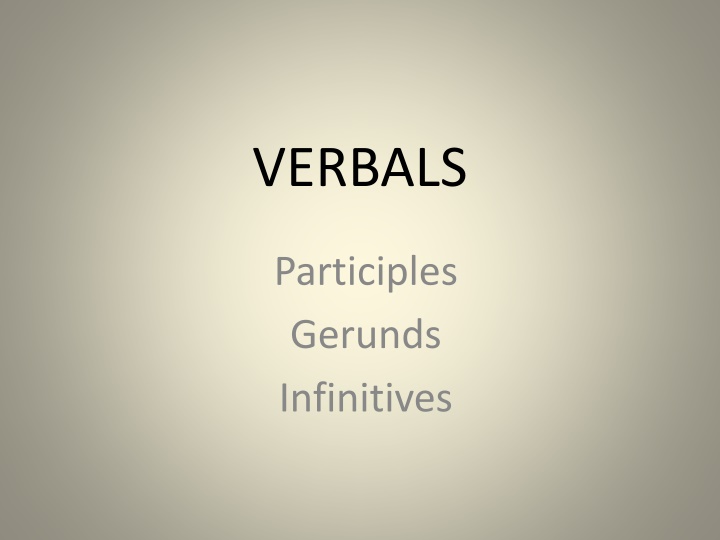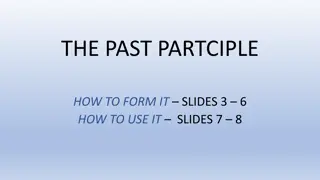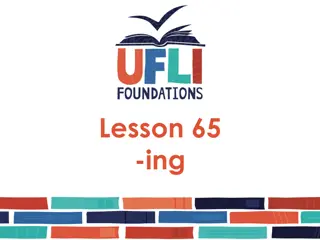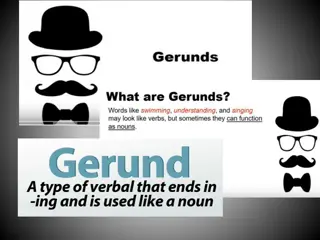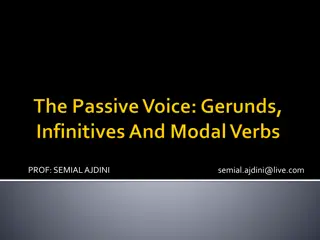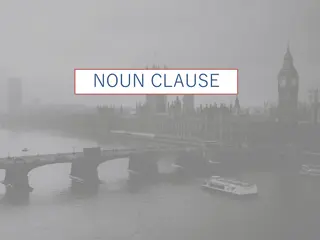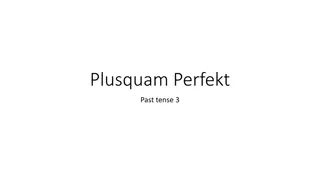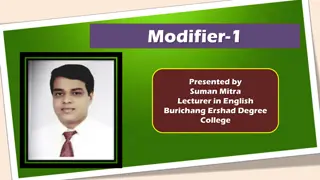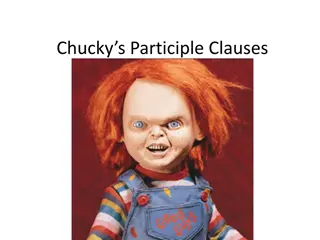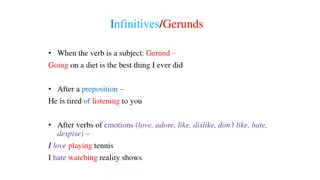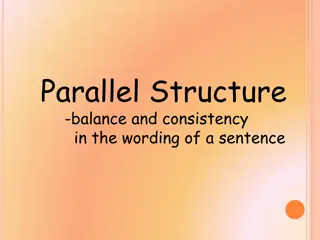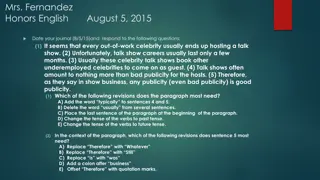Mastering Verbals: Participles, Gerunds, and Infinitives
Delve into the world of verbals including participles, gerunds, and infinitives. Learn to identify and label these verb forms, understand their functions, and explore how they contribute to the structure and meaning of sentences. Enhance your knowledge of parts of speech and unravel the nuances of verbals through comprehensive examples.
Download Presentation

Please find below an Image/Link to download the presentation.
The content on the website is provided AS IS for your information and personal use only. It may not be sold, licensed, or shared on other websites without obtaining consent from the author.If you encounter any issues during the download, it is possible that the publisher has removed the file from their server.
You are allowed to download the files provided on this website for personal or commercial use, subject to the condition that they are used lawfully. All files are the property of their respective owners.
The content on the website is provided AS IS for your information and personal use only. It may not be sold, licensed, or shared on other websites without obtaining consent from the author.
E N D
Presentation Transcript
VERBALS Participles Gerunds Infinitives
OBJECTIVE: *Identify the components of a sentence. *Recognize, identify, and label verbals ~participles, gerunds, and infinitives~ and verbal phrases.
Understanding the wonderful world of verbals relies on some prior knowledge so let s review. *A sentence is made up of words. *Words function in a sentence as a particular part of speech. *Every word in a sentence can be labeled as a particular part of speech.
Parts of Speechcan you name the eight parts of speech?? 1. 5. 2. 6. 3. 7. 4. 8.
Part of speech is determined by how a word is used in a sentence. In other words, you have to read words in a sentence in order to correctly label the part of speech.
There is a hybrid (or you may call them morphed) group of words known as VERBALS. Which of the eight parts of speech do you think is associated with these hybrids?
VERBALS are verb words that function in a sentence as nouns, adjectives, or adverbs.
The words FORM and FUNCTION are important in identifying verbals properly.
read verb I read books. She will read a story to the class. Joe read the newspaper. reading verb Students were reading during class. reading adjective Everyone loves reading class! The reading teacher handed out new AR logs. reading noun Reading is important. You can find the answer by reading the story. He likes reading. to read noun -- Students tried to read the directions.
pArticiples usually end in ing or ed (occasionally en or nt ending) function as Adjectives in a sentence The running coach was not at practice. Everyone is excited for the snowboarding trip! I threw the cracked egg away. The broken toys can be fixed. No one ate the burnt toast.
geruNds verb words that end in ing function as Nouns in a sentence Texting is a popular way to communicate. Chorus members began singing. The clown entertained the group by juggling.
GeruNds form = verb word with -ing ending function = NOUN Nouns can be found in many different parts of a sentence. Mary gave Joe a ride to the game. N N N N (subject) (IO) (DO) (obj of the preposition) Walking is great exercise. Dan prefers bicycling. Jim and his sister exercise by running.
infinitives to + verb function as a noun, an adjective, or an adverb Students worked to finish the assignment. In class, we began to write an essay. Athletes practice to improve. A field goal is the only way to win.
DO NOT CONFUSE INFINITIVES WITH PREPOSITIONAL PHRASES!!!!!!!!!!!!! to run to the store to eat to my friend to fly to the game to play to the library
IN CONCLUSION, You already read, write, and speak using verbals. It is important to have a good understanding of them so that you can use them properly in your speaking and writing.
WHAT YOU NEED TO KNOW VERBALS often appear in sentences as phrases. -a phrase is a group of words -phrases are identified by how the phrase begins
Types of phrases include verb phrase prepositional phrase gerund phrase infinitive phrase participial phrase
Participial phrases are used to modify another word and should be placed close to the word they are modifying. A MISPLACED MODIFIER can occur when the participial phrase is not properly placed.
Walking next to the pro football player, my brother seemed tiny. Disgusted by the bad service, the couple left the restaurant. We found the puppy sleeping under a park bench. The committee, frustrated by the lack of participation, cancelled the event.
Can you identify the misplaced modifier? Wearing pajama pants, the dog was walked by my brother. We saw geese driving along the lake. The guests admired the statue walking through the museum.
